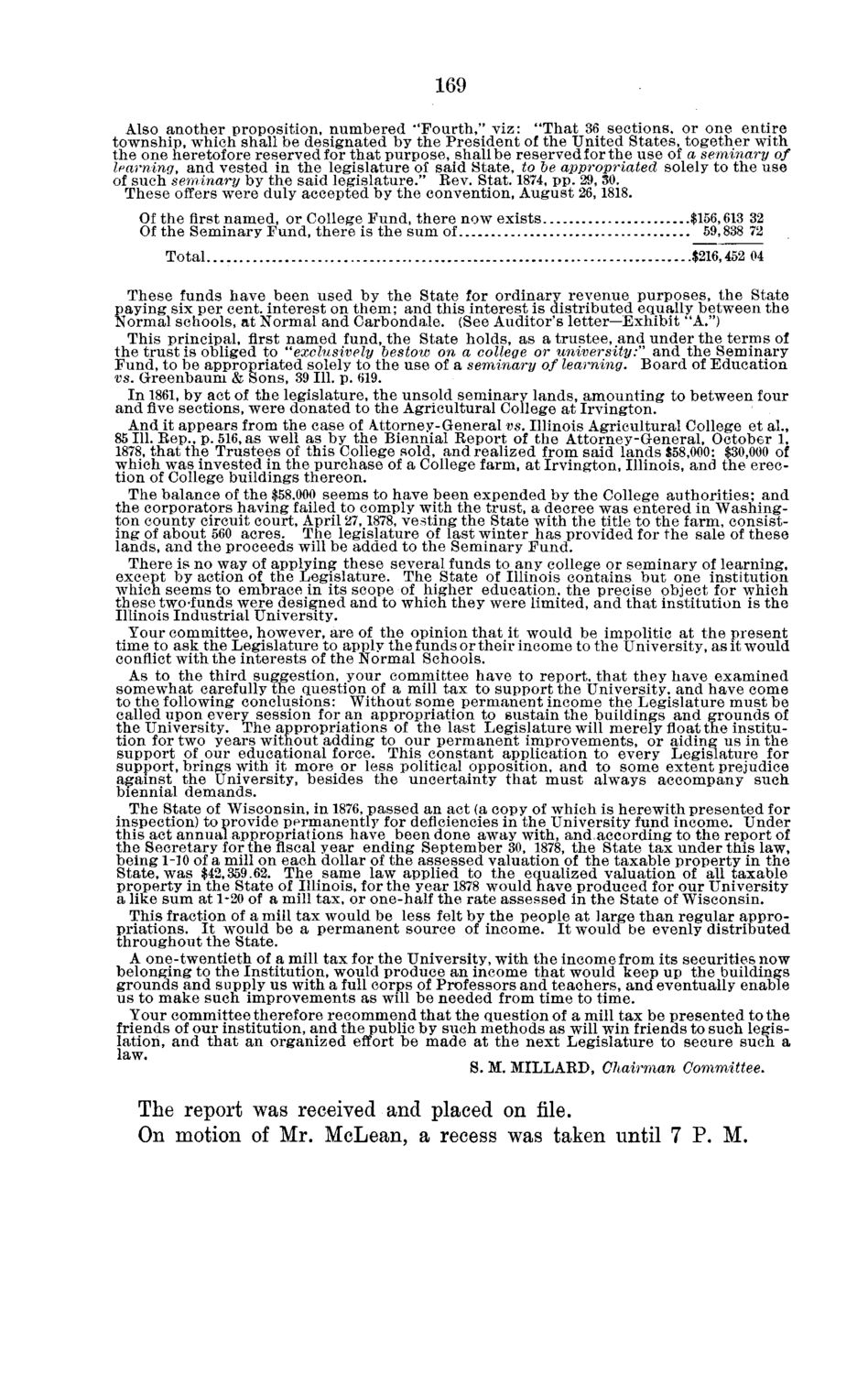| |
| |
Caption: Board of Trustees Minutes - 1880
This is a reduced-resolution page image for fast online browsing.

EXTRACTED TEXT FROM PAGE:
169 Also another proposition, numbered "Fourth," viz: "That 36 sections, or one entire township, which shall be designated by the President of the United States, together with the one heretofore reserved for that purpose, shall be reserved for the use of a seminary of learning, and vested in the legislature of said State, to he appropriated solely to the use of such seminary by the said legislature." Rev. Stat. 1874, pp. 29, 30. These offers were duly accepted by the convention, August 26,1818. Of the first named, or College Fund, there now exists $156,613 32 Of the Seminary Fund, there is the sum of 59,838 72 Total $216,452 04 These funds have been used by the State for ordinary revenue purposes, the State paying six per cent, interest on them; and this interest is distributed equally between the Normal schools, at Normal and Carbondale. (See Auditor's letter—Exhibit "A.") This principal, first named fund, the State holds, as a trustee, and under the terms of the trust is obliged to "exclusively bestow on a college or university:" and the Seminary Fund, to be appropriated solely to the use of a seminary of learning. Board of Education vs. G-reenbaum & Sons, 39 111. p. 619. In 1861, by act of the legislature, the unsold seminary lands, amounting to between four and five sections, were donated to the Agricultural College at Irvington. And it appears from the case of Attorney-General vs. Illinois Agricultural College et al., 85111. Rep., p. 516, as well as by the Biennial Report of the Attorney-General, October 1, 1878, that the Trustees of this College sold, and realized from said lands $58,000: $30,000 of which was invested in the purchase of a College farm, at Irvington, Illinois, and the erection of College buildings thereon. The balance of the $58,000 seems to have been expended by the College authorities; and the corporators having failed to comply with the trust, a decree was entered in Washington county circuit court, April 27,1878, vesting the State with the title to the farm, consisting of about 560 acres. The legislature of last winter has provided for the sale of these lands, and the proceeds will be added to the Seminary Fund. There is no way of applying these several funds to any college or seminary of learning, except by action of the Legislature. The State of Illinois contains but one institution which seems to embrace in its scope of higher education, the precise object for which these two*funds were designed and to which they were limited, and that institution is the Illinois Industrial University. Your committee, however, are of the opinion that it would be impolitic at the present time to ask the Legislature to apply the funds or their income to the University, as it would conflict with the interests of the Normal Schools. As to the third suggestion, your committee have to report, that they have examined somewhat carefully the question of a mill tax to support the University, and have come to the following conclusions: Without some permanent income the Legislature must be called upon every session for an appropriation to sustain the buildings and grounds of the University. The appropriations of the last Legislature will merely float the institution for two years without adding to our permanent improvements, or aiding us in the support of our educational force. This constant application to every Legislature for support, brings with it more or less political opposition, and to some extent prejudice against the University, besides the uncertainty that must always accompany such biennial demands. The State of Wisconsin, in 1876, passed an act (a copy of which is herewith presented for inspection) to provide permanently for deficiencies in the University fund income. Under this act annual appropriations have been done away with, and according to the report of the Secretary for the fiscal year ending September 30, 1878, the State tax under this law, being 1-10 of a mill on each dollar of the assessed valuation of the taxable property in the State, was $42,359.62. The same law applied to the equalized valuation of all taxable property in the State of Illinois, for the year 1878 would have produced for our University a like sum at 1-20 of a mill tax, or one-half the rate assessed in the State of Wisconsin. This fraction of a mill tax would be less felt by the people at large than regular appropriations. It would be a permanent source of income. It would be evenly distributed throughout the State. A one-twentieth of a mill tax for the University, with the income from its securities now belonging to the Institution, would produce an income that would keep up the buildings grounds and supply us with a full corps of Professors and teachers, and eventually enable us to make such improvements as will be needed from time to time. Your committee therefore recommend that the question of a mill tax be presented to the friends of our institution, and the public by such methods as will win friends to such legislation, and that an organized effort be made at the next Legislature to secure such a law. S. M. MILLARD, Chairman Committee. The report was received and placed on file. On motion of Mr. McLean, a recess was taken until 7 P. M.
| |